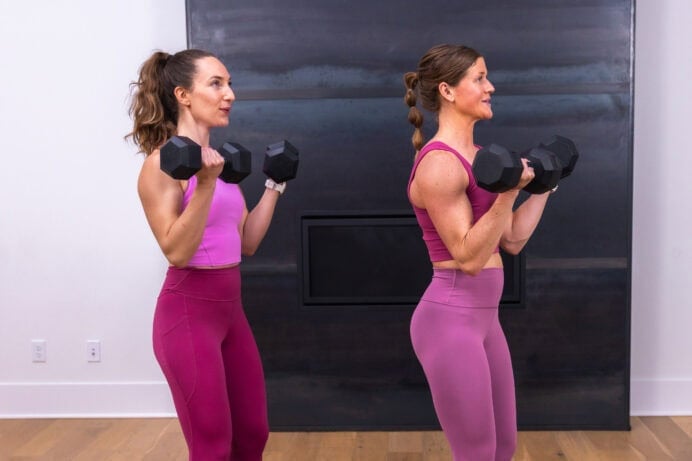
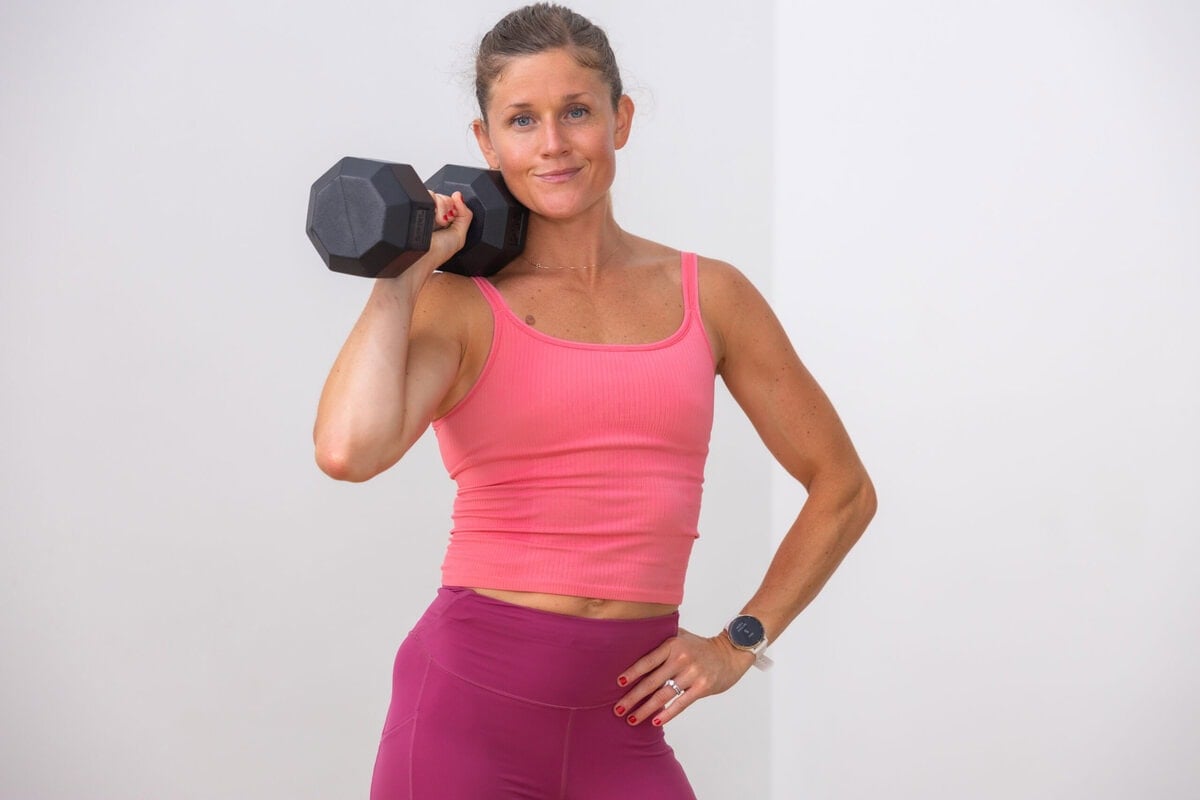
20-Minute Ab and Arm Day Workout (All Standing)
Build strong, defined arms with this all-standing ab and arm day workout routine. We’ll target the biceps, triceps, back, chest and shoulders; all from a standing position. The no repeat format is perfect for days you’re feeling low on motivation, or just want to mix up your standard arm day workout.
As a personal trainer, I had some hesitations about the popularity of “no repeat” workouts.
Although these workouts can be fun and motivating, they don’t tend to work the muscles to fatigue, which is necessary for muscle growth.
Today’s workout is the perfect compromise between being engaging and being effective.
I’ve programmed this standing workout to include 14 unique compound exercises, or exercises that target multiple upper body muscle groups at once.
This allows us to hit each muscle group in the upper body multiple times throughout the workout, without repeating exercises.
Today’s arm routine is a complete upper body dumbbell workout, targeting every major muscle group in the arms, back and chest in one workout. This is different from some of our popular isolation-style workouts, such as the best back exercises and best shoulder exercises which focus on one muscle group for the entire workout.
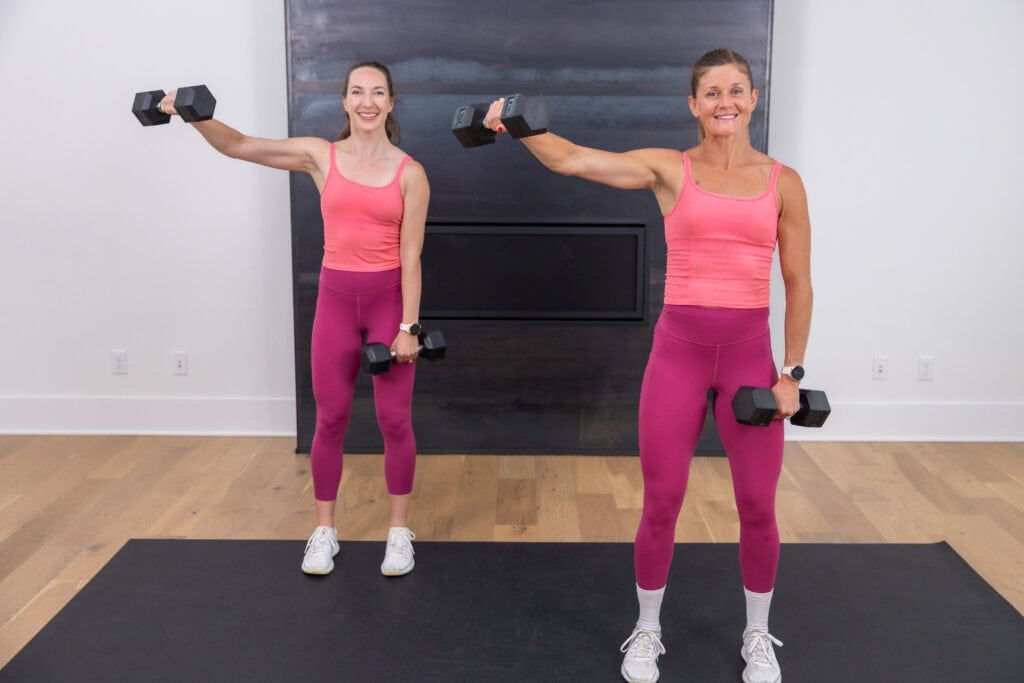
20-Minute Ab and Arm Day Workout
The best dumbbell exercises for building strong arm and ab muscles.
A complete arm workout for women. Targeting every muscle group in the upper body: the push muscles (chest, triceps and shoulders), pull muscles (biceps and back) and core.
Add upper body strength training workouts like this one to your home workout plan one to two times a week to improve arm definition, build strength and increase endurance.
Workout Instructions:
Follow along with the guided Abs and Arm Day Workout Routine on YouTube, led by certified personal trainer, Lindsey Bomgren.
Your Workout Looks Like This:
- 14 Arm Day Exercises
- Timed Intervals (40 seconds work, 20 seconds rest)
- Perform Each Exercise x1 Set (no repeats)
Workout Equipment:
Medium Pair of Dumbbells. I recommend between 5-25 lbs depending on your fitness level. We used 15 and 20 lb dumbbells in today’s workout.
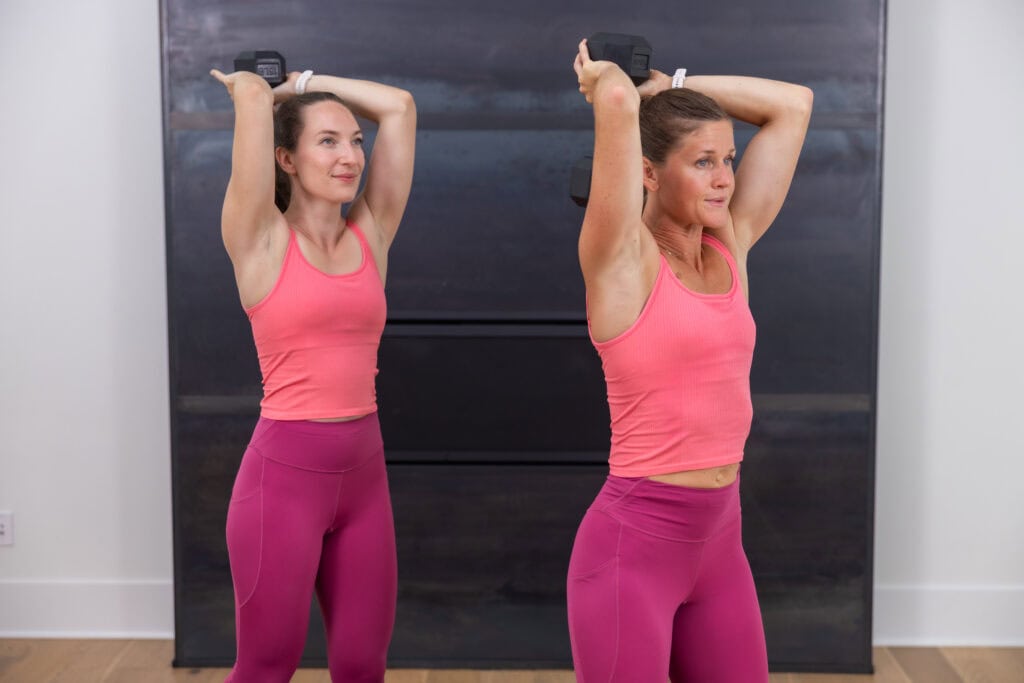
Prefer to Watch On YouTube?
Workout Outline
- Lateral Raises
- Cross-Body Chop and Shoulder Press (Right)
- Bicep Curl and Shoulder Press
- Cross-Body Chop and Shoulder Press (Left)
- Bicep Curls
- Standing Oblique Crunch (Right)
- Reverse Grip Back Row and Bent Over Bicep Curl
- Standing Oblique Crunch (Left)
- Single Arm Batwing Back Row
- Balance Single Arm Back Row and Tricep Kickback (Right)
- Eccentric Overhead Tricep Extension
- Balance Single Arm Row and Tricep Kickback (Left)
- Standing Chest Fly
- Chest Press and Two Alternating Cross-Body Crunches
7 Best Arm Day Exercises (All Standing)
Lateral Raise
Targets: The lateral deltoid (also engages the anterior deltoids and posterior deltoid).
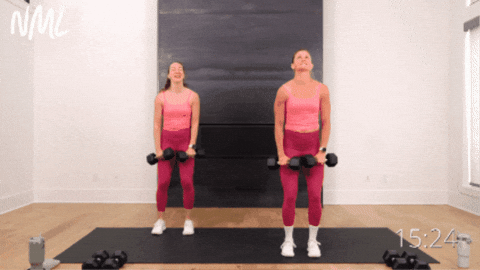
How To Do Lateral Raises
- Stand with feet shoulder-width apart, slight bend in your knees, holding a dumbbell in each hand at hip level, palms facing in towards each other.
- Engage your core, then lift the dumbbell in your right hand out towards your right side, keeping a slight bend in the elbow. Lift just to shoulder height to protect the shoulder joint.
- With control, lower the dumbbell, slowly returning to the starting position.
- Then repeat, this time performing a lateral raise with the dumbbell in your left hand.
Bicep Curl and Shoulder Press
Targets: The biceps brachii (the front of your arms), shoulders, triceps, rear delts, upper back and core.
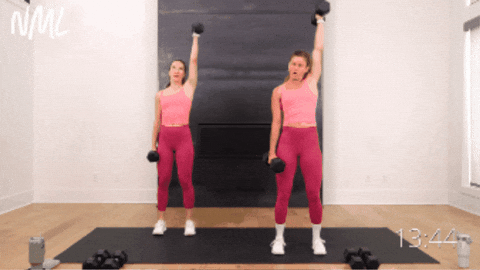
How To Do Bicep Hammer Curls and Shoulder Presses
- Start standing, feet shoulder-width apart and core engaged. Hold a dumbbell in each hand at your sides, palms facing in towards each other (hammer curl).
- Then, perform a bicep curl on the right side, squeezing the front of your arm to curl the dumbbell in your right hand up to shoulder height. Think about keeping your elbow tucked into your side and shoulder blades pulled down.
- Pause when the dumbbell reaches your shoulder, then perform a narrow overhead shoulder press by pushing the dumbbell overhead until your right arm is fully extended, bicep near your ear.
- Slowly and with control, lower the dumbbell down to shoulder level. Then curl the weight down to your side, returning to starting position.
- Repeat, this time performing a bicep curl and then a shoulder press on the left side.
- Continue this pattern, alternating sides with each rep.
Bicep Curl
Targets: The biceps brachii (the front of your arms). This classic bicep exercise hits both heads of the biceps muscle.
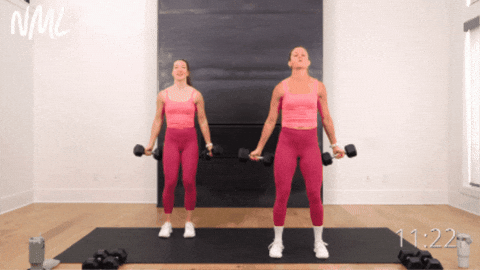
How To Do Bicep Curls
- Start standing with feet hip width apart and holding a dumbbell in each hand at your sides, palms facing outward (underhand grip or supinated grip).
- Exhale as you squeeze your bicep muscle to curl the weights up to shoulder-height. Think about keeping elbows tucked into your sides and shoulder blades pulled down.
- With control, slowly lower the dumbbells down to your sides. Return to the starting position and repeat.
Reverse Grip Back Row and Bent Over Bicep Curl
Targets: Both the lower back and upper back (specifically the lats and rhomboids) as well as the biceps.
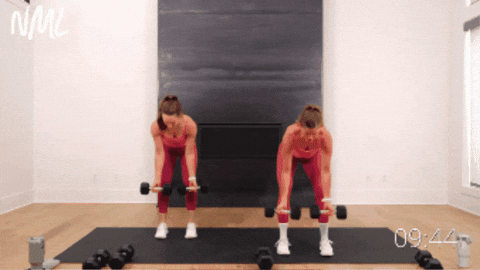
How To Do Reverse Grip Back Rows and Bent Over Bicep Curls
- Stand with your feet hip-width apart, knees slightly bent.
- Grip a set of dumbbells, palms facing out away from the body.
- Hinge at the hips until your chest is parallel to the floor (neck in line with your spine, flat back, and belly button and rib cage pulled in).
- Pull the weights back towards your hips, squeezing the shoulder blades together.
- With control, slowly lower the dumbbells back down to the starting position.
- Then, maintain a hinged position as you curl the dumbbells up towards your shoulders, performing a standard grip bicep curl.
- Slowly and with control, lower the dumbbells, returning to the starting position.
- Continue this pattern, alternating one reverse grip back row with one bent over bicep curl.
Single Arm Batwing Back Row
Targets: Latissimus dorsi (or lats; the largest back muscle known for its large, flat “V” shape), abs and core.
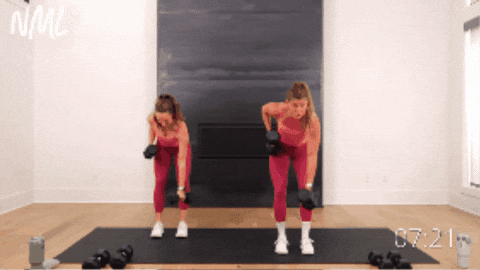
How To Do Single Arm Batwing Back Rows
- Start standing with feet hip-width apart, knees slightly bent. Hold dumbbells in both hands, palms facing in (narrow grip).
- Perform a single arm back row on the right by pulling your right elbow to the right hip. Hold the dumbbell in your right hand at the top of this row position.
- Then, pull the dumbbell in your left hand towards your left hip, before lowering with control. Repeat, performing three single arm back rows.
- After the third single arm row on the left, hold the dumbbell in your left hand at your left hip at the top of a row position. Then, lower the dumbbell in your right hand.
- Squeeze your back to pull your right elbow to your right hip, performing a single arm row. Repeat, performing three single arm back rows on the right side.
- Continue this pattern, alternating three single arm rows on each side while holding the opposite arm in an isometric hold.
Eccentric Overhead Tricep Extension
Targets: The lateral head, medial head and long head of the triceps.
This is a form of elbow extension, which recruits all three heads of the tricep muscles. The eccentric portion, or slow lowering of the weight, makes this one of my favorite tricep exercises.
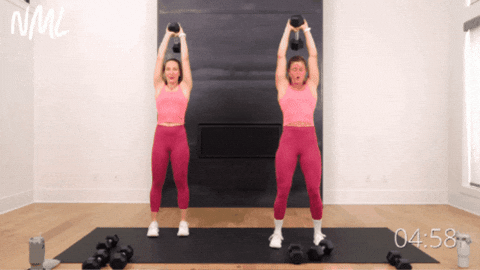
How To Do Eccentric Overhead Tricep Extensions
- Stand with feet hip-distance apart, core engaged and soft bend in your knees.
- Hold one dumbbell vertically overhead and activate your core by squeezing your glutes and abs to protect your lower back.
- Bend your elbows to a 90-degree angle, slowly bringing the dumbbell(s) behind your head. Keep your elbows close to your ears throughout the entire movement (don’t let your elbows flare out as you fatigue).
- Slowly lower the weight on a three-count, increasing the time the muscle is under tension.
- Then squeeze through the back of your arms to straighten your elbows and extend your arms overhead, returning to the starting position.
Standing Chest Fly
Targets: Upper arms, chest, shoulders, abs and core.
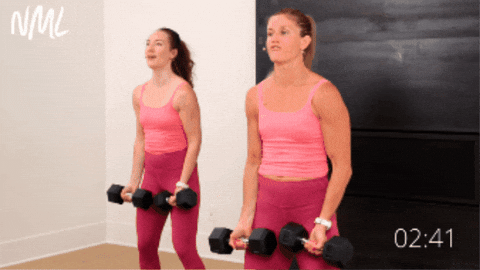
How To Do Standing Chest Flys
- Stand with your feet hip-width apart, knees slightly bent. Hold one dumbbell in each hand at your sides; palms face out away from the body (underhand grip). Shoulder blades pulled down towards your hips.
- Squeeze your chest as you lift your right hand across your body bringing the dumbbell in the right hand parallel to your left shoulder. Think “right pinky finger to left shoulder”. Palm faces up towards the ceiling.
- Keep a soft bend in your elbow as you lower the dumbbell back to starting position with control. Range of motion will be different for everyone.
- Repeat on the left arm, alternating arms with each rep.
Arm Day Workout FAQs
I personally like to program a mix of isolation exercises (targeting one specific muscle) and compound exercises (targeting multiple muscle groups) during my arm day workouts. A basic arm day routine might include 4-5 exercises; targeting the chest, back, biceps, triceps and shoulders.
Progressive overload and protein are the two most important things you should prioritize if you want to see muscle growth and definition in your upper body. Progressive overload means gradually increasing the intensity and difficulty of your workouts over time. You can do this by using heavier weights, increasing reps or sets, or increasing time under tension. I personally aim for 30 grams of protein at each meal.
If you struggle with push ups, you can try placing your hands on an incline such as a countertop or chair to reduce the intensity. Alternatively, you can substitute a dumbbell chest press or barbell chest press for push ups.
More Workouts
Upper Body WorkoutsPin This Workout: Arm Day Routine
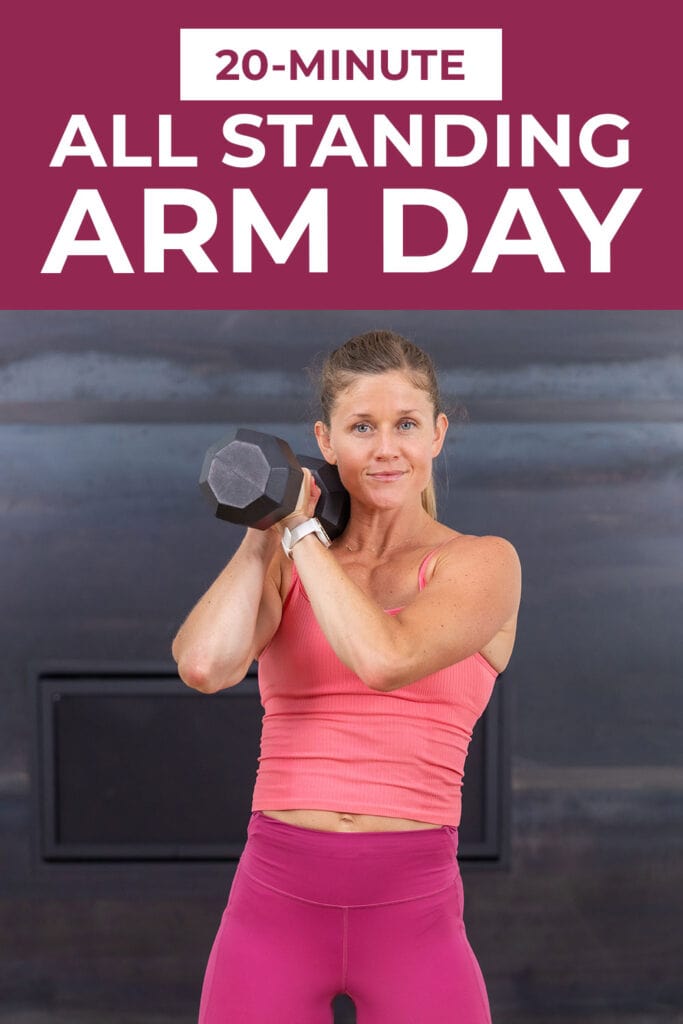
This post includes affiliate links. I do earn a commission for products purchased using these links (at no additional cost to you). Thank you for supporting Nourish Move Love, making the content you see on this blog possible.










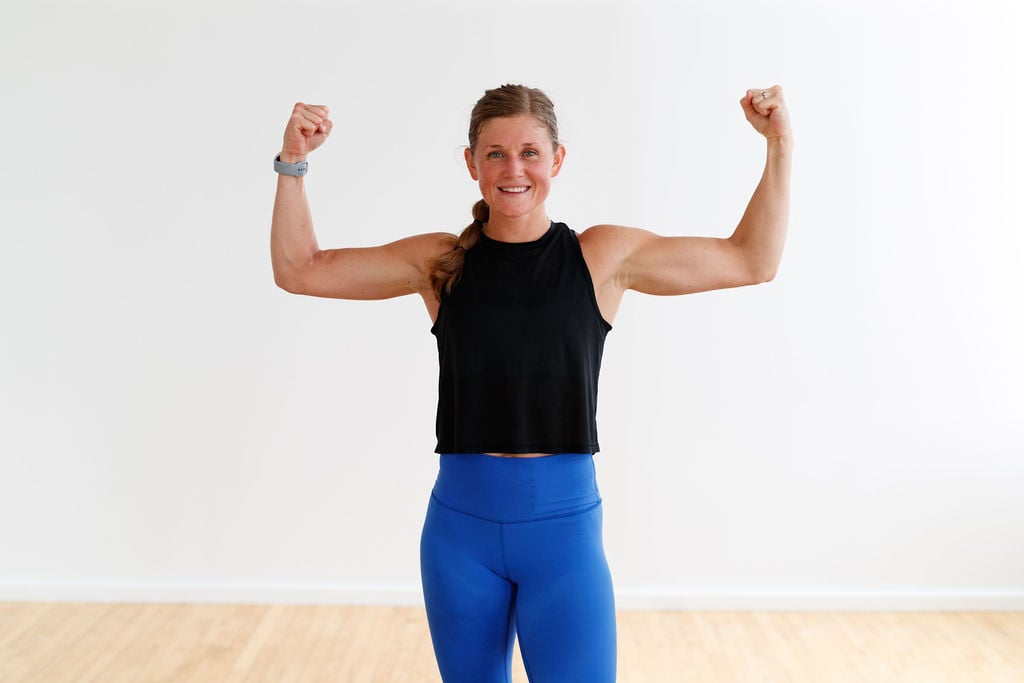
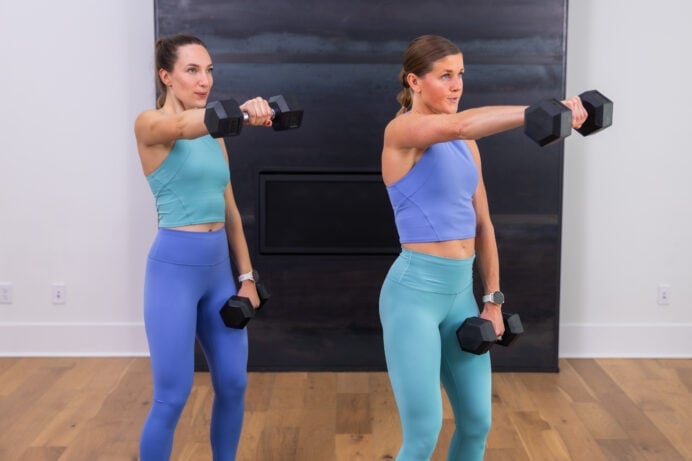
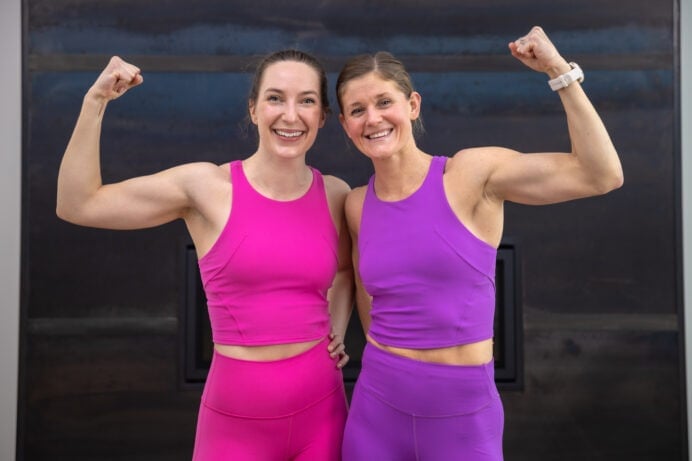
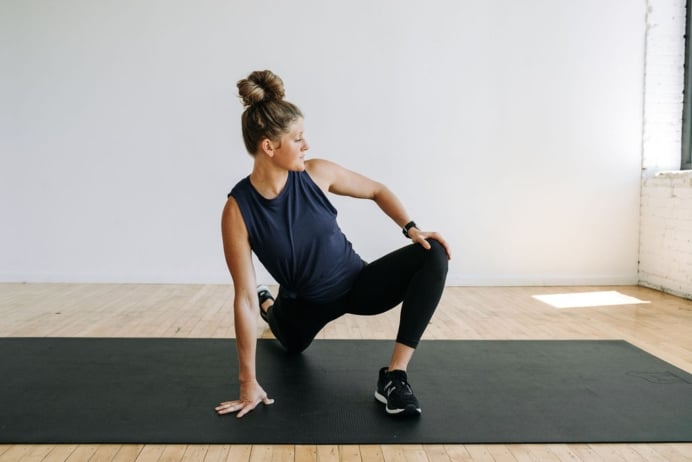
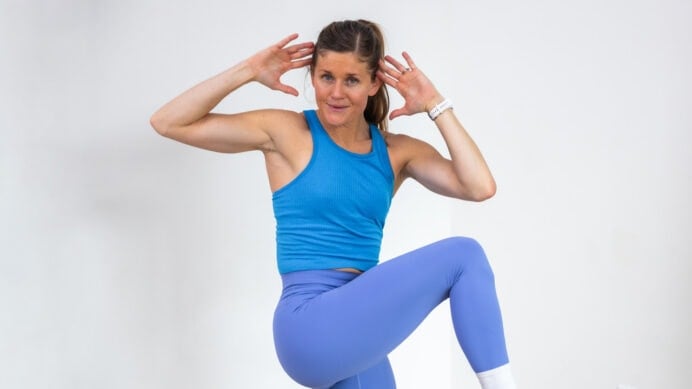
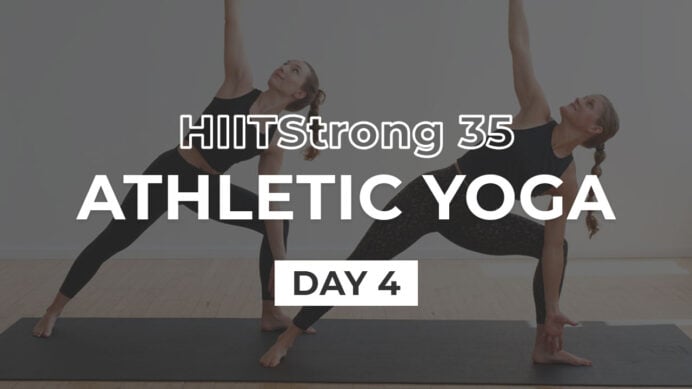
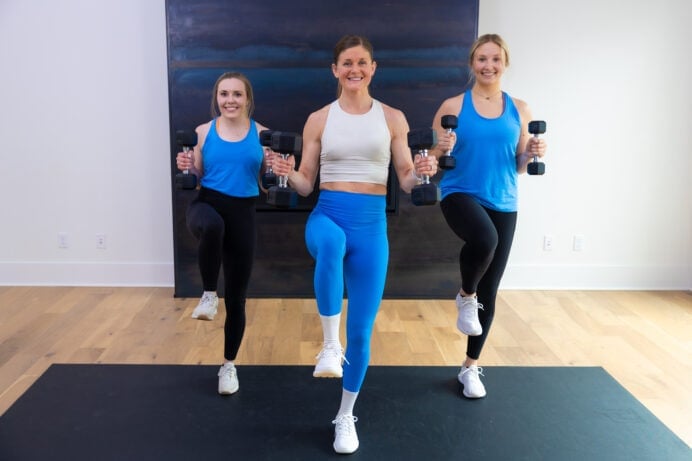
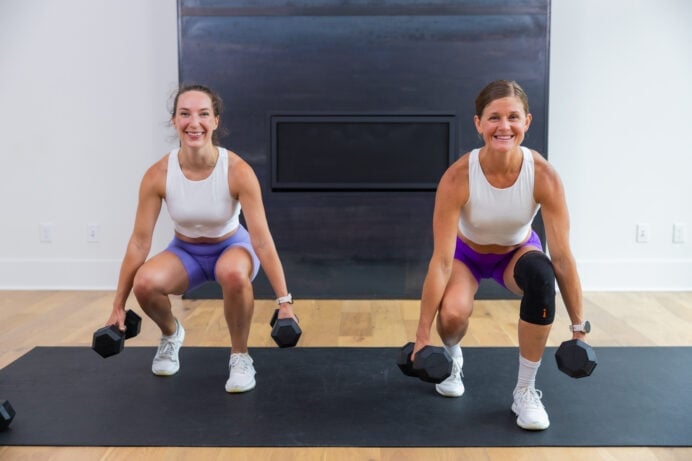
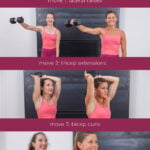
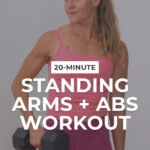
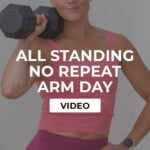
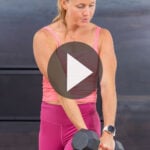
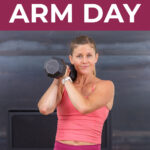
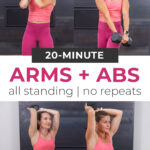
LOVE this format. Thank you for another fun burn!
I am so glad you enjoyed this workout, Erika! Thanks for trying it! -Lindsey